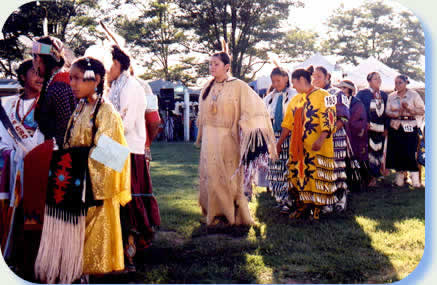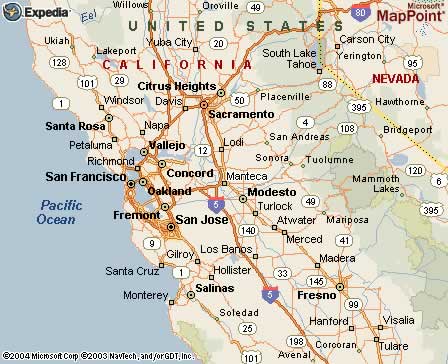|
|
Canku Ota |
|
|
(Many Paths) |
||
|
An Online Newsletter Celebrating Native America |
||
|
June 19, 2004 - Issue 115 |
||
|
|
||
|
Dancing is Teen's Sacred Passion |
||
|
by Rose Albano Risso Staff reporter of the Manteca (Calif.) Bulletin |
||
|
credits: photo: Scene from 2003 Three Rivers Indian Lodge Powwow and Summer Ceremonies. (Photograph Courtesy of Manuel 'Monolin' Moreno, Three Rivers Indian Lodge Employee of the Year. |
|
Sierra High School junior keeps Miwuk & Maidu traditions alive
But where her dancing path diverges from the rest of the swirling, writhing and toe-tapping mass of teen-aged humanity is in the purpose of this fun activity. For Williams, dancing is a sacred tradition that will impact not just her lifetime but untold generations yet to come. "I'm a Miwuk and Maidu California Indian. My roots are from the Calaveras County area. That's where my family comes from," the 16-year-old Sierra High School junior porudly declared. She is also a trained basket weaver and a member of the California Basket Weaver Association. The dances that Williams goes to mainly during the harvest season are simply referred to in her Native American heritage as "Roundhouse" or "Big Time" dances, the latter at her family's church in West Point in Calaveras County where her ancestors came from. Big Times are mainly held in the fall. We have Big Times in September because Big Times are to celebrate the harvest of acorns that our people lived off of; that's our main food source. Or that was our main food source in the early days," Williams explained with the clear knowledge of one who has been steeped in her native tradition and culture starting from the tender age of four when she remembers going to the dances for the first time with her parents and other relatives. She has also danced in Roundhouse ceremonies at Indian Grinding Rock (Chaw-Se), Yosemite (Bear Dance), Tuolumne (Acorn Festival), and at the Colusa Reservation (Big Head). "We dance the traditional California way. I was just kind of born into it. You just grow up around it. That's what I knew since I was a little girl," said the oldest of the three children of Doug and Daveen Williams of Manteca who is being honored this year as the presiding queen of the 27th annual Three Rivers Indian Lodge Powwow and Summer Ceremonies in Manteca during the Fourth of July weekend. Attending the three-day powwow where traditional dances constitute the major highlight is going to be a new experience for Williams. "I don't go to powwows. I do go to Big Time. That's where all the California Indians go and that's where California Indians dance their way," she explained. Still, she feels highly honored at being "asked" by Three Rivers to be their powwow princess this year. Thanks in part to its longevity and accompanying popularity, the Three Rivers powwow today perennially attracts the best tribal and intertribal dancers, many of them entire families, not just from all over the United States but also from Canada and Mexico. This also explains the heavy traffic of spectators who come to watch the variety of motley colored and elaborate costumes, as well as to browse through the many Native American arts and crafts booths or to munch on a tasty fried Indian taco for lunch. Except for the variety of featured dances and dancers, the Roundhouse dances that Williams has always been used to are not much different from the powwow. They are both big family affairs. "It's mainly like a big family reunion. Everybody's family comes and we all eat. We have all kinds of little stuff - eating and dancing. A lot of people bring their crocks and baskets. Sometimes the adults play handgames - it's like gambling - whil ekids just play with each or bring their football and play football. But it's mainly dancing and eating," Williams said. Of course, everybody wears thair traditional California outfits to these events, she added. "We either make our own or other people make them for us. Mine was given to me by my aunt. I made my sister's costume," said Williams of her baby sister's buckskin skirt which she wears with a tank top. The tank top is worn for modesty's sake; in the olden days, young girls simply wore the buckskin skirt sans a top, Williams explained. Her sister is five-year-old Isabela, or B-Lo as she likes to call herself after her favorite Hollywood star, Jennifer Lopez, whose nickname is J-Lo. Both sisters and their brother Asumute nicknamed Cubby all dance the traditional California way, Williams explained. Both of her younger siblings attend Brock Elliott Elementary School. Like their sister, both are also being made aware by their family about the importance of perpetuating their culture and heritage. As a school project, Cubby made a miniature reproduction of a Roundhouse complete with dancers inside. His work, with a little help from his parents, earned him an A from his fourth-grade teacher Kelsey Kolendich. As a traditional Native dancer, Williams has already accomplished major strides. Two years ago, she was invited by the Xochut Aztec dance group of Robert and Laura Castro of San Jose to take part in the Xilonen Maiden ceremony in Watsonville. That was a particularly big honor since selection is based on a young girl's "exceptional character as a role model for younger girls," explained Williams. That same year, she also traveled to Rosebud in South Dakota to support her aunt Darlene Brown-Elk at Solider Creek, Sundance, with Floratine Blue Thunder. Not one to waste a sterling opportunity to learn, Williams took the time before coming home to visit historical sites that are highly important to Native American people nationwide such as Bear Butt, the Crazy Horse monument and the site of Wounded Knee. Likewise, she is using her reign as Three Rivers Lodge Powwow queen to honor her ancestors. She is dedicating her involvement in this event in memory of her late fraternal grandfather, WilsonRay (Frog) and her aunt Barbara "Auntie Barb" Baker. Several of the Williams' clan members continue to live in West Point including fraternal grandmother Lois Williams. Maternal grandmother Gladys Jeff followed the Williams family and moved to Manteca in the early 1990s. It was Raquel Williams' late maternal great-grandfather, Manuel Jeff, who gave her the Miwuk name Pachuk-a-lu when she was a baby, which means Snow Bird. The teen-age powwow princess has not limited herself to Native American involvements. She is also into sports, particularly softball, volleyball and basketball. Currently, she and her mother are playing on a women's softball league in Stockton. This is just part of the strong family values that her parents insist on inculcating in their children's mind. Doug and Daveen always make it a point to plan everything around the family. "They call it making memories for their children," Raquel explained. And even though her parents don't dance, "they support us a lot and take us where the dances are. They come inside the Roundhouse. They are my cheerleaders," she said with a laugh. Besides her traditional involvements, Raquel has also been active in a number of community civic projects. Last year, she donated 30 hours of community service when she organized a team to walk in the ALS (Amyothropic Lateral Sclerosis) awareness-raising event in Modesto in honor of family friend Theresa McNeilage of Lathrop who is afflicted with this incurable disease. Also last year, Raquel did 86 hours of service as the teen representative for the Indian Educational Title VII program. In all of these, she has not forgotten her academic pursuits and goals in life. After graduation, she plans to attend community college before transferring to a university to finish her degree. She is currently looking at pursuing careers in either environmental law, American Indian studies, or sports physical therapy. But keeping her traditional culture and heritage alive for posterity through her dancing and basket weaving will remain a lifelong passion and dedication. "I like to do it because it's the traditional way," she said of her basket weaving. "I make them for fun but I also make them to keep the tradition alive," she concluded. |
|
|
www.expedia.com |
|
|
||
|
|
||
| Canku Ota is a free Newsletter celebrating Native America, its traditions and accomplishments . We do not provide subscriber or visitor names to anyone. Some articles presented in Canku Ota may contain copyright material. We have received appropriate permissions for republishing any articles. Material appearing here is distributed without profit or monetary gain to those who have expressed an interest. This is in accordance with Title 17 U.S.C. Section 107. | ||
|
Canku Ota is a copyright © 2000, 2001, 2002, 2003, 2004 of Vicki Barry and Paul Barry. |
||
 |
 |
|
|
The "Canku Ota - A Newsletter Celebrating Native America" web site and its design is the |
||
|
Copyright © 1999, 2000, 2001, 2002, 2003, 2004 of Paul C. Barry. |
||
|
All Rights Reserved. |
||
 Like
most teen-agers, Raquel Williams loves to go to dances and have
a good time.
Like
most teen-agers, Raquel Williams loves to go to dances and have
a good time.